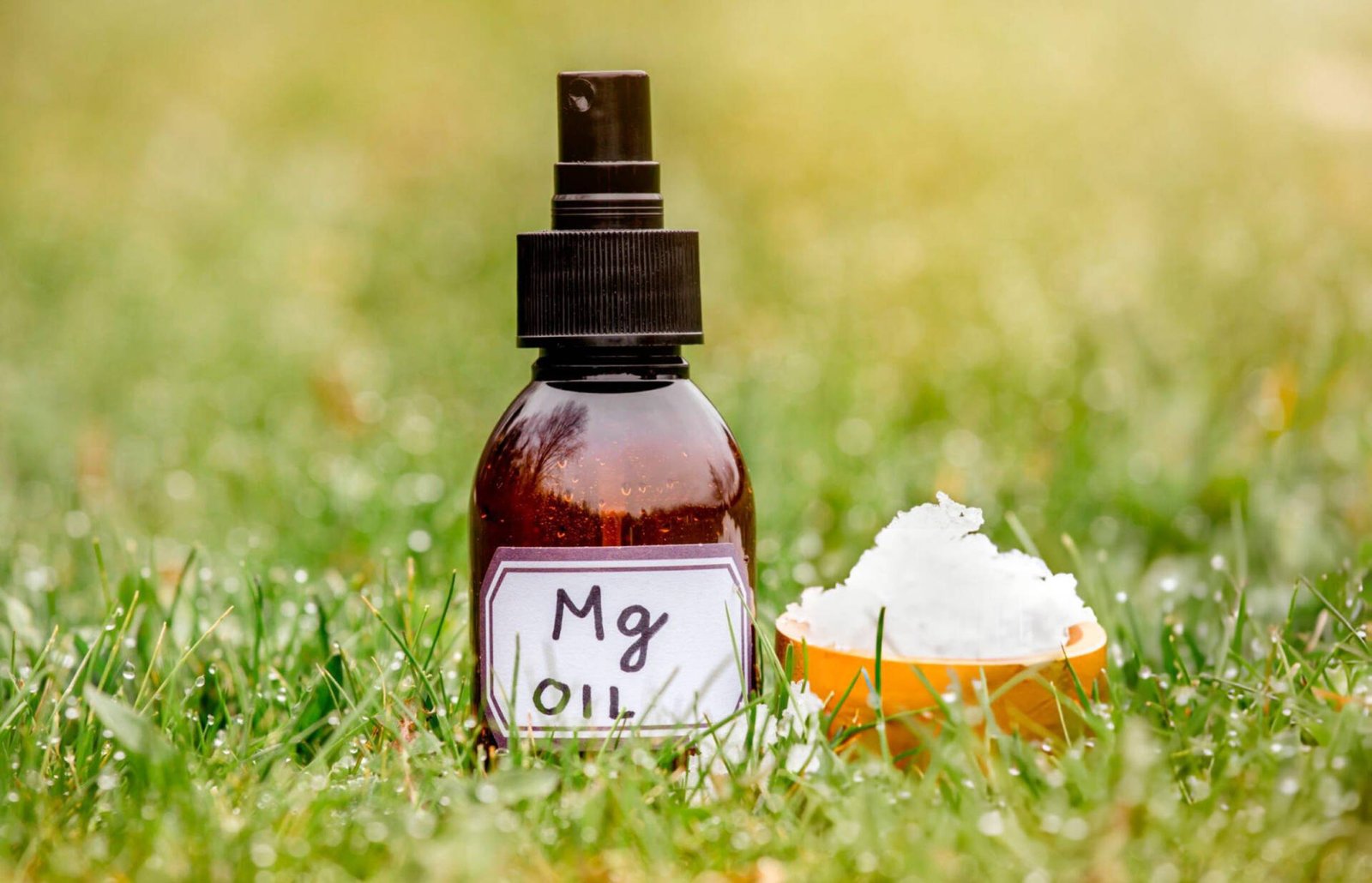Are you a natural health seeker or wellness enthusiast searching for a simple yet powerful way to boost your well-being? Look no further than magnesium oil! This incredible mineral solution offers a treasure trove of health benefits, from soothing sore muscles to enhancing sleep quality. In this blog post, we’ll dive into the wonders of magnesium oil, its excellent benefits, and how you can easily incorporate it into your daily routine for a healthier, happier life. Let’s unlock the secrets to a better you!
Table of Contents
Brief Overview of Magnesium Oil

Definition of Magnesium Oil
Magnesium oil is a concentrated solution of magnesium chloride dissolved in water. Despite its name, it’s not an oil but feels oily to the touch. This transdermal (through the skin) application allows direct absorption into the bloodstream, bypassing the digestive system. Using magnesium oil can benefit those who have difficulty absorbing magnesium through dietary sources or supplements.
It can be applied to various parts of the body, such as the arms, legs, and abdomen, and is often used to relieve muscle tension, reduce pain, and promote relaxation. Regular application can contribute to overall well-being by helping to maintain adequate magnesium levels in the body, which is essential for numerous physiological functions, including energy production, nerve function, and muscle contraction.
Common Sources of Magnesium Oil
Magnesium oil is typically made from magnesium chloride flakes harvested from ancient seabeds or salt lakes, offering a rich source of this essential mineral. These flakes are then dissolved in purified water to create the oil, resulting in a highly concentrated solution. When applied topically, magnesium oil is easily absorbed through the skin, allowing the body to benefit from its numerous health advantages, such as relieving muscle tension, reducing inflammation, and promoting relaxation.
Importance of Magnesium for Health
Magnesium is a vital mineral required for over 300 biochemical reactions in the body. These include muscle and nerve function, energy production, and bone health. It plays a crucial role in maintaining normal heart rhythm, supporting the immune system, and regulating blood glucose levels.
Unfortunately, many people suffer from magnesium deficiency, which can lead to a host of health issues such as muscle cramps, fatigue, and even severe conditions like osteoporosis and cardiovascular disease. Ensuring an adequate magnesium intake through diet or supplements is essential for overall health and well-being.
Benefits of Magnesium Oil

1. Skin Health
Hydration and Moisturizing Properties
Magnesium oil is highly effective at hydrating and moisturizing the skin. It absorbs quickly and penetrates deeply, delivering essential nutrients that help maintain the skin’s moisture barrier. This makes it particularly beneficial for individuals with dry or sensitive skin, as it can alleviate discomfort and improve overall skin texture. Regular use of magnesium oil can lead to softer, smoother, and more resilient skin, making it a valuable addition to any skincare routine.
Effect on Conditions like Eczema and Psoriasis
Magnesium oil can offer significant relief for those struggling with skin conditions like eczema and psoriasis. Its potent anti-inflammatory properties help soothe irritated skin, reduce redness, and alleviate itching. Magnesium oil also aids in skin hydration, promoting a healthier skin barrier.
Additionally, its calming effects can help reduce stress, which is often a trigger for flare-ups in these conditions. Incorporating magnesium oil into your skincare routine may provide a natural and effective solution for managing persistent skin issues.
2. Muscle and Joint Health
Relief from Muscle Cramps and Spasms
Athletes and active individuals often turn to magnesium oil for muscle relief. This mineral plays a crucial role in muscle function by helping to relax muscle fibers, reducing cramps and spasms. Magnesium oil is also beneficial for those suffering from conditions like restless leg syndrome, as it can alleviate the discomfort associated with involuntary muscle movements. In addition, it supports overall muscle recovery and can improve sleep quality, making it a valuable addition to the wellness routines of both professional athletes and fitness enthusiasts.
Reduction in Joint Pain and Inflammation
Magnesium oil has potent anti-inflammatory properties that can help reduce joint pain and inflammation. It penetrates the skin and reaches the affected areas, providing targeted relief. Regular use can ease discomfort associated with arthritis and other joint-related issues, improving overall mobility and quality of life. Magnesium oil can also aid in muscle recovery and relaxation, making it a versatile addition to your wellness routine.
Benefits for Athletes and Active Individuals
Athletes can significantly benefit from magnesium oil due to its numerous advantages. This potent mineral aids in muscle recovery by helping to relax and repair muscle tissues. It also reduces muscle fatigue, allowing athletes to train harder and longer without experiencing the same level of exhaustion.
Magnesium oil enhances overall performance by improving energy production and reducing the likelihood of muscle cramps. Applying it before and after workouts can significantly change an athlete’s routine, helping them achieve better results and maintain peak physical condition.
3. Stress Relief and Relaxation

Calming Effect on the Nervous System
Magnesium is crucial in regulating the nervous system, ensuring nerve impulses are transmitted efficiently and effectively. When applied topically, magnesium oil can penetrate the skin and enter the bloodstream, providing a direct route for its calming effects. This can help to reduce stress and anxiety levels, promoting a sense of relaxation and overall well-being.
Promotion of Better Sleep Quality
Are you struggling with sleep? Magnesium oil might be the solution you’ve been looking for. This essential mineral plays a crucial role in regulating sleep patterns and improving the quality of rest. By promoting relaxation and reducing stress, magnesium oil makes it easier to fall asleep and stay asleep through the night. It supports muscle function and can alleviate nighttime cramps, contributing to a more restful and uninterrupted sleep experience.
Alleviation of Anxiety and Stress Symptoms
In addition to its calming effects, magnesium oil can alleviate symptoms of anxiety and stress. Promoting relaxation helps keep cortisol levels in check, reducing the physical and emotional toll of stress. Many people find that regular use of magnesium oil improves their sleep quality, improving overall health and well-being.
It’s a natural remedy that supports the body’s ability to handle daily pressures, making it a valuable addition to any self-care routine. Whether applied through massage or added to a warm bath, the benefits of magnesium oil are both extensive and profound.
4. Cardiovascular Health
Improvement in Circulation
Magnesium oil can enhance blood circulation, which is vital for cardiovascular health. Improved circulation means better oxygen and nutrient delivery to tissues, promoting overall well-being. This increased flow not only supports heart health but also aids in muscle recovery, reduces muscle soreness, and can even help manage blood pressure.
Regularly using magnesium oil can contribute to better energy levels, enhanced physical performance, and a greater sense of vitality.
Regulation of Blood Pressure
One of magnesium’s key benefits is its ability to regulate blood pressure. This essential mineral plays a vital role in relaxing blood vessels and improving blood flow. Using magnesium oil can help maintain healthy blood pressure levels, reducing the risk of heart disease and other cardiovascular issues. By ensuring adequate magnesium intake, you can support overall heart health and well-being.
Support for Heart Health
Magnesium is essential for heart health. It helps maintain a regular heartbeat, supports the function of heart muscles, and reduces the risk of cardiovascular events. This vital mineral also aids in relaxing blood vessels, improves circulation, and contributes to the overall stability of blood pressure. Ensuring adequate magnesium intake can play a crucial role in preventing heart-related diseases and promoting a healthier cardiovascular system.
5. Bone Health
Enhancement of Calcium Absorption
Magnesium is critical for calcium absorption, a vital process for maintaining bone health. When your body has adequate magnesium levels, it can more effectively absorb calcium from your foods, ensuring that this essential mineral is utilized correctly. Using magnesium oil can enhance your body’s calcium absorption, promoting more robust and healthier bones. Regularly applying magnesium oil can also help prevent deficiencies that might lead to bone-related issues such as osteoporosis or fractures.
Prevention of Osteoporosis
Regular use of magnesium oil can help prevent osteoporosis, a condition characterized by weak and brittle bones that affects millions worldwide, especially older people. By supporting bone density and promoting calcium absorption, magnesium oil contributes significantly to long-term skeletal health. This essential mineral strengthens bones and plays a crucial role in muscle function and overall well-being.
6. Energy Production
Role in ATP (Adenosine Triphosphate) Production
Magnesium is a key player in the production of ATP, the body’s energy currency. ATP is vital for numerous biochemical reactions and overall cellular function. Using magnesium oil can significantly boost your energy levels, making it easier to tackle daily tasks with vigor and enthusiasm.
Magnesium supports muscle and nerve function, regulates blood sugar levels, and aids in protein synthesis, further contributing to your overall well-being and performance.
Increase in Overall Energy Levels
Are you feeling sluggish? Magnesium oil can help. By supporting energy production at the cellular level, it can increase your overall vitality and reduce feelings of fatigue. This essential mineral plays a crucial role in over 300 biochemical reactions, including muscle function and nerve signaling.
Regularly using magnesium oil can lead to better sleep, an improved mood, and enhanced physical performance, making it an excellent addition to your daily wellness routine. Give your body the boost it needs with magnesium oil!
How to Use Magnesium Oil

1. Topical Application
Steps for Applying Magnesium Oil to the Skin
Applying magnesium oil is simple and effective. You are spraying it directly onto clean, dry skin to ensure maximum absorption. Gently massage it in using circular motions to help it penetrate deeper. Common areas for application include the arms, legs, and abdomen, but you can also apply it to other areas of the body where you may feel muscle tension or soreness.
Let it sit for at least 20 minutes before rinsing off any residue for best results. Incorporating this into your daily routine can help improve magnesium levels and promote overall well-being.
Recommended Dosage and Frequency
Start with a few sprays and gradually increase as your body adjusts to the magnesium oil. Initially, you might experience a tingling sensation, which should diminish over time. It’s generally recommended to apply magnesium oil once or twice a day for best results, ideally after a shower when your skin is clean, and pores are open. Consistent use can help improve magnesium levels, reduce muscle soreness, and promote overall relaxation.
2. Massage Therapy

Incorporation into Massage Routines
Incorporating magnesium oil into massage therapy can significantly enhance its benefits. The oil helps relax muscles and reduce tension, making massages more effective. Magnesium oil is known for its ability to improve circulation and alleviate muscle soreness, which can further contribute to overall relaxation and well-being. Regular use of magnesium oil in massages can also help replenish the body’s magnesium levels, which are essential for various bodily functions, including nerve function and energy production.
Benefits of Combining Magnesium Oil with Other Oils
Combining magnesium oil with other essential oils can provide additional benefits, enhancing its overall effectiveness. For example, mixing magnesium and lavender oil can significantly enhance relaxation, reduce stress, and improve sleep quality. On the other hand, combining it with peppermint oil can invigorate the senses, boost energy levels, and improve mental clarity. These combinations not only leverage the individual properties of each oil but also create synergistic effects that promote overall well-being.
3. Foot Soaks and Baths
Preparation of Magnesium Oil Foot Soaks
Foot soaks are a great way to enjoy magnesium oil’s benefits. Add a few sprays of the oil to warm water and soak your feet for 15-20 minutes. This practice can help alleviate muscle tension, reduce stress, and improve overall relaxation. For an even more soothing experience, consider adding some Epsom salts or essential oils to the water. Regular foot soaks can contribute to better foot health and provide a relaxing end to a long day.
Benefits of Adding Magnesium Oil to Bathwater
Adding magnesium oil to your bathwater can provide full-body relaxation and numerous health benefits. The warm water helps open pores, allowing for better absorption of magnesium, which can aid in reducing muscle tension, improving sleep quality, and relieving stress. This simple addition to your bath routine can transform an ordinary soak into a spa-like experience, promoting overall wellness and tranquility.
4. DIY Magnesium Oil Spray

Recipe for Homemade Magnesium Oil Spray
Making your own magnesium oil spray is easy and cost-effective. To get started, dissolve magnesium chloride flakes in distilled water, typically using one part magnesium flakes to one part water. Stir the mixture until the flakes are thoroughly dissolved. Once the solution is ready, transfer it to a spray bottle for convenient application.
This DIY approach allows you to control the concentration, customize it to your specific needs, and ensure there are no unwanted additives. Regularly using magnesium oil can help improve muscle function and reduce cramps, making it a great addition to your wellness routine.
Tips for Storage and Use
Store your homemade magnesium oil spray in a cool, dark place to maintain its potency and effectiveness over time. Shake the bottle thoroughly before each use to ensure the ingredients are well mixed. Apply the spray to your skin as needed, focusing on areas where you may be experiencing muscle tightness or discomfort. Regular application can help alleviate muscle cramps and promote relaxation.
Potential Side Effects

1. Skin Irritation
Identification and Management of Allergic Reactions
While rare, some individuals may experience skin irritation or allergic reactions to magnesium oil. Symptoms can include redness, itching, or swelling at the application site. If you notice any of these signs, it is important to discontinue use immediately. To ensure your safety and well-being, consult a healthcare professional for advice and potential alternatives. Always conduct a patch test before using any new topical product, especially if you have sensitive skin or a history of allergies.
Steps to Take if Irritation Occurs
If irritation occurs, rinse the affected area thoroughly with cool water and gently pat it dry with a clean towel. Afterward, apply a soothing lotion or aloe vera gel to help calm the skin and reduce any redness or discomfort. For those with sensitive skin, it is advisable to perform a patch test by applying a small amount of magnesium oil to a discreet area, such as the inside of the wrist or elbow, and wait 24 hours to observe any adverse reactions before using it extensively. This precaution can minimize the risk of irritation and ensure a more comfortable experience.
2. Gastrointestinal Issues
Possible Digestive Discomfort from Transdermal Magnesium
Transdermal magnesium can sometimes cause mild digestive discomfort, such as cramping or bloating. This is usually temporary and can be minimized by adjusting the dosage or frequency of application. If pain persists, consulting a healthcare professional for personalized advice and recommendations may be helpful.
Overuse and Toxicity
Symptoms of Magnesium Overdose
Overusing magnesium oil can lead to toxicity, although this is rare. Nausea, diarrhea, and muscle weakness are signs of magnesium toxicity, which can occasionally also include abdominal cramping and low blood pressure. If you experience any of these symptoms, you must reduce your usage immediately and consult a healthcare provider to discuss your symptoms and get appropriate advice. Regular monitoring and proper dosage can help prevent these issues and ensure the safe use of magnesium oil.
Safe Usage Guidelines to Prevent Toxicity
To prevent toxicity, it is crucial to follow the recommended dosages and avoid excessive application of any substance or medication. Overuse can lead to adverse effects and long-term health issues. Always read the instructions on the label carefully and adhere to them strictly. Additionally, it is advisable to consult a healthcare professional for personalized advice tailored to your specific health needs and circumstances. They can offer valuable guidance and ensure you use products safely and effectively.
Conclusion
Magnesium oil offers many benefits, from improved skin health to better cardiovascular function. By incorporating it into your daily routine, you can enjoy these advantages and enhance your overall well-being. However, using it responsibly and consulting with a healthcare provider before starting any new health regimen is essential.
For those eager to explore the wonders of magnesium oil, now is the perfect time to get started. Invest in your health and discover the magic of this incredible mineral.





